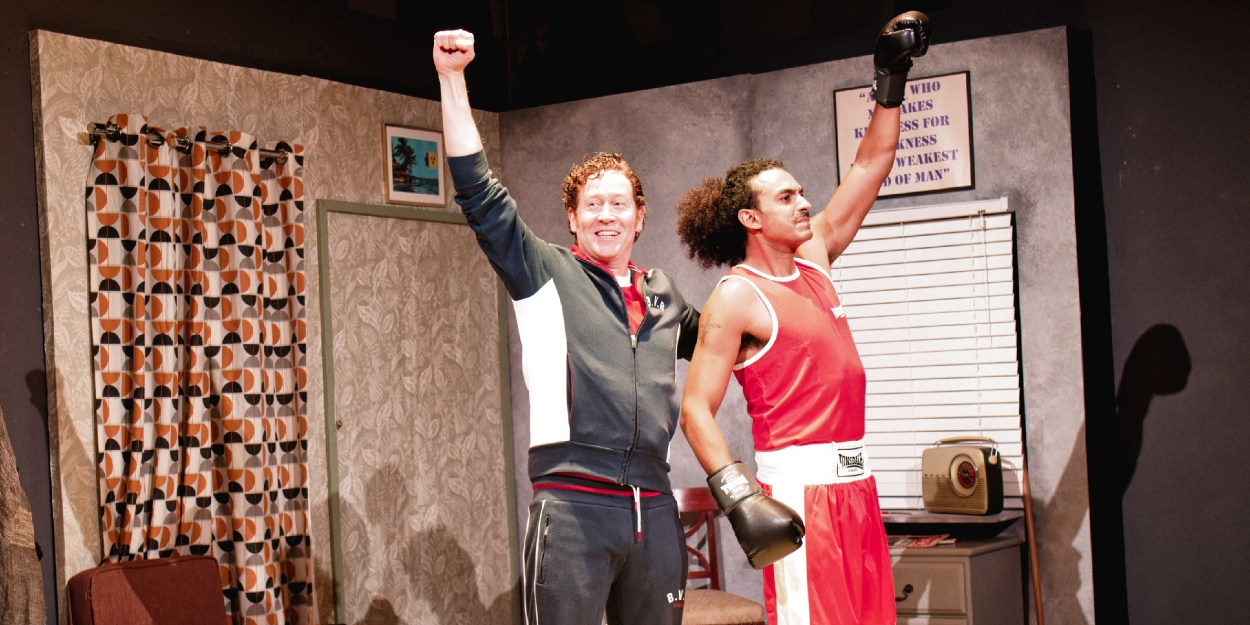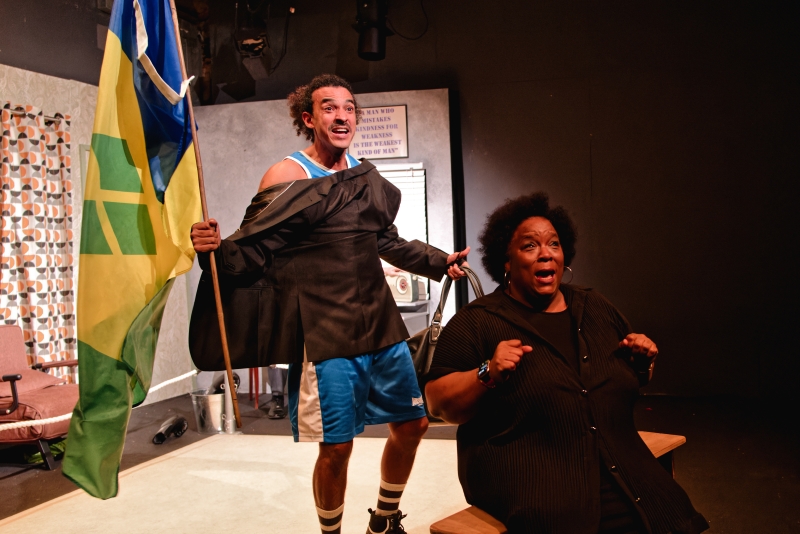Review: GOING FOR GOLD, Park Theatre
Boxer's life portrayed with technical skill and real heart

 Boxing provides the backdrop to a number of celebrated movies (Raging Bull, Rocky and, more recently, Creed) and also enjoys some wonderful journalism, from AJ Liebling almost a century ago to the present day through Donald McRae and Steve Bunce (involved behind the scenes in this production). At this point it’s almost obligatory to mention the sport’s parallels with Shakespearean tragedy, no less valid for their hackneyed quality, but remarkable because there are so few plays about boxing. Well, we have one now.
Boxing provides the backdrop to a number of celebrated movies (Raging Bull, Rocky and, more recently, Creed) and also enjoys some wonderful journalism, from AJ Liebling almost a century ago to the present day through Donald McRae and Steve Bunce (involved behind the scenes in this production). At this point it’s almost obligatory to mention the sport’s parallels with Shakespearean tragedy, no less valid for their hackneyed quality, but remarkable because there are so few plays about boxing. Well, we have one now.
On a stage that suggests a boxing ring (and not much suggestion is needed, stages are like rings, actors are like boxers, a curtain call has an implied question within it - “Are you not entertained?”) we see the life of Frankie Lucas arc from the 1960s to the 2020s. We also learn why even fans of the sweet science might struggle to recall his career - though they’ll know many of those who assisted him, who trained with him and who thwarted him, as he navigated his way to not quite the top.
Jazz Lintott first presents as a nine-year-old Frankie, fresh off the boat from St Vincent, turning up at Ken Rimington’s (Cyril Blake) club in Croydon, part of a police-run initiative to keep lads out of trouble, Special Patrol Group insignia on the wall, just to let them know. He soon shows promise, the stubbornness required to progress in anything if you start at the bottom and, at 18, the need to succeed too, already the father of a baby boy, Michael. Llewella Gideon plays the long-suffering, sharp-tongued Gene and also acts as our narrator, injecting just enough exposition to pilot us through the decades.
The play takes off as Frankie first encounters the machinations of boxing’s politics when, despite being the best credentialled candidate, he is not picked for the 1974 Commonwealth Games. The sport’s unabashed post-war colour bar lay in the past, but promoters, led by their kingpin, Mickey Duff, still favoured white boxers, a veneer of business imperatives barely shrouding their racism. Frankie and Ken invent the St Vincent Boxing Association on the spot and that one man team “brings home” the gold medal to London. With a bright future ahead of him, Frankie crosses the Thames and joins the avuncular maverick, George Francis (Nigel Boyle), whose stable of black fighters are, literally and metaphorically, punching their way to the Championship belts.

Lintott (son of the play’s writer, first-timer, Lisa Lintott) gets the crucial element of movement right, David Gilbert and Rupert Chamack learning from Dear England that sports people command spaces as actors do - but differently. Lintott bounces on his toes, shadow punches with fast hands and skips with fast feet. Like many boxers, he’s almost feline in a stillness and grace that can turn at any second into ferocious attack. Get that wrong and many in every audience (but especially on opening night when I was sitting just in front of John Conteh - The John Conteh) will roll their eyes and ponder the vicissitudes of the Victoria Line for the trip home, disbelief unsuspended.
If Ken was Frankie’s father figure, George is that best friend who’ll tell you that you’ve a smudge of lipstick on your collar and who’ll pick you up when you feel the world is against you. But, inevitably, he’s as obstinate as his protégé and demands that Frankie wait his turn for his chance, the de facto cartel at the top of British boxing reluctant to let George’s fighters into the ring on the big nights. Lintott catches Frankie’s growing despair, financially and professionally, his turn to weed as a crutch and his neglect of both Gene and Michael, for which he feels guilty. (Younger people may be ready to condemn him for that, however it was all but expected by men and women not so long ago).
Coming in at just shy of two and a half hours, the production is often gritty, sometimes funny and always credible. It has much to say about racism in England in the 70s, a legacy that lives on well beyond the shameful treatment of the Windrush Generation, and plenty too about masculinity in a changing world. That comes out most in a third act in which an aged, reclusive Frankie speaks to his son (Daniel Francis-Swaby) in a scene which is a little too long, a little too sentimental in its exploration of the compensations of reconciliation. There’s banger after banger on the soundtrack too!
Going For Gold wears its heart on its sleeve, pays a fine tribute to its hero without ever patronising him with an undeserved and unwanted sugar-coating, and gives a humanity to the boxers we see in the projected photographs, their hollow-eyed stares speaking to the hard craft in which they trade. If there’s a better, shorter play inside the one we see, the 12 rounds we do go with a flawed, betrayed, charismatic prizefighter are still rewarding and thought-provoking. So save your cash and don’t pay for the charade of Mike Tyson vs Jake Paul - instead spend it at the Park Theatre on a drama and not a circus.
Going For Gold is at Park Theatre until 30 November
Photo images: James Potter
Reader Reviews

Videos
